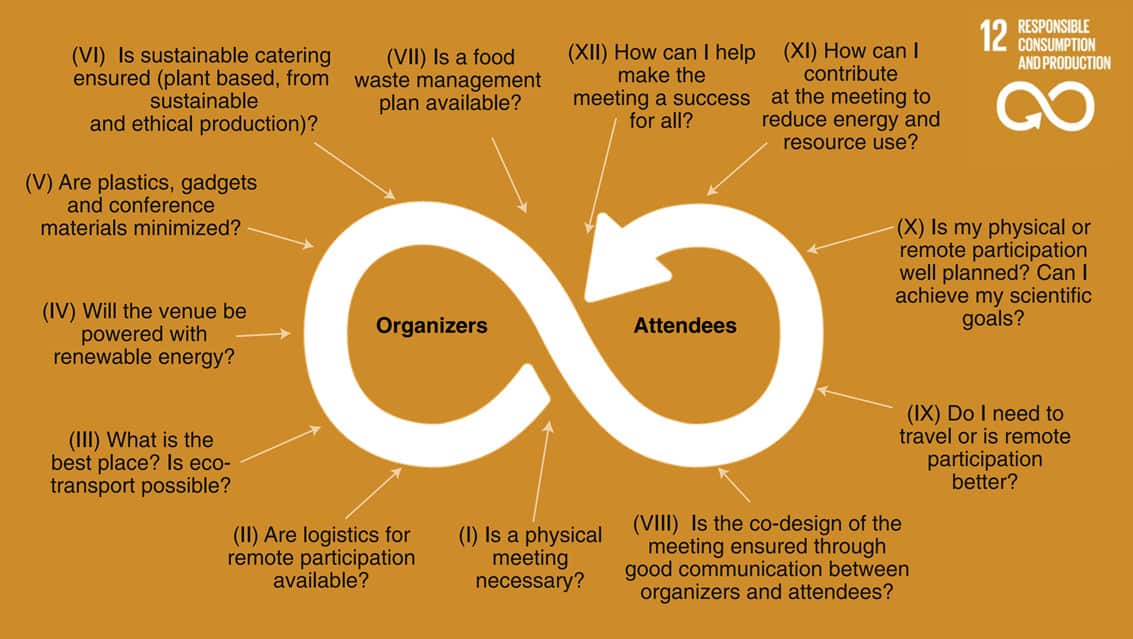
IIASA researcher Raquel Guimaraes and former research assistant Debbora Leip encourage the support of the Cercedilla Manifesto, arguing that it is high time for the scientific community to take responsibility and set an example by making research meetings more sustainable.
The research community widely agrees that strong action is needed to counteract the climate crisis that is currently taking place. Nevertheless, scientists regularly meet at conferences that are often far from sustainable. Problems range from participants flying to attend events, to unnecessary gadgets and gifts handed out at the meetings, and unsustainable catering at conference dinners. In light of the current public debate on environmental and social sustainability, we call on scientists to take a leading role in changing their work practices towards more sustainable habits, starting with research meetings.
In April 2020, Alberto Sanz-Cobena and several colleagues published an article titled Research meetings must be more sustainable in Nature Foods. They presented the Cercedilla Manifesto with 12 sustainability decisions as guidelines for organizers and attendees of research meetings (see Figure 1). The starting point of the manifesto is to question whether a physical meeting is indeed necessary. If organizers decide that it is, there is still the question of whether each single attendee really needs to physically join the conference. Often, remote participation can be equally efficient if a technical solution is provided by the organizers. Furthermore, if a decision to conduct a physical meeting is taken, organizers have to consider what food will be served.
The authors state that excessive amounts of food and food waste are very common at meetings, which makes a change of mindset towards better food management very important, not only for climate change, but for many other environmental threats. In our opinion, this point has so far been neglected in public debate.
 © IIASA
© IIASA
Given the urgency for climate change action and the need for individuals to play an active role – with research scientists taking the lead – we assert that it is urgent to start changing our habits and setting an example regarding environmental and social sustainability in research meetings. Indeed, many of us take it for granted that to meet and discuss our work, we must travel. Most attendees do not even question that unnecessary gadgets and gifts are distributed or that opulent dinners are provided.
We hope that the Cercedilla Manifesto will raise awareness about the fact that good scientific output often does not require a physical meeting by providing a conceptual framework for change in this regard. If we support the manifesto, we stand a chance to lower the barrier to dare deviating from currently applied practices. The 12-sustainability decisions were designed by specialists to serve as a reference for anybody who wishes to organize/attend a sustainable meeting.
In the current situation brought about by the global COVID-19 crisis, almost everybody has experienced that remote conferences are not only possible, but also efficient – sometimes even more so than a physical meeting would have been. First, it saves time in terms of travel. Second, it may be more inclusive by allowing people to attend, who would not have had the opportunity to join otherwise, be it for financial, family, or other reasons. In addition, remote meetings provide additional features, like a chat function that could add another discussion layer.
Of course, remote meetings also have their limitations: informal in-person meetings during coffee breaks, for example, can enhance networking and free discussions, and sometimes contribute significantly to a meeting’s outcome. Virtual meetings also face several other challenges, such as participation by attendees from different time zones, or poor internet connections. These issues could however easily be addressed by spreading the meeting over more days, in such a way that the need for attendance outside of acceptable time slots is minimized, and by investing saved traveling costs into better equipment.
Let us learn from this experience and not go ‘back to normal’ after the COVID-19 crisis. We should take this as an opportunity to speed up change and tackle the other global crisis of climate change!
You can find the petition at openpetition.eu/!cercedillamanifesto. We encourage you to share and support this initiative.
References:
Sanz-Cobena A, Alessandrini R, Bodirsky BL, Springmann M, Aguilera E, Amon B, Bartolini F, Geupel M, et al. (2020). Research meetings must be more sustainable. Nature Food 1, 187–189. DOI: 10.1038/s43016-020-0065-2
Frisch B, & Greene C (2020). What it takes to run a great virtual meeting. Harvard Business Review. https://hbr.org/2020/03/what-it-takes-to-run-a-great-virtual-meeting?ab=hero-subleft-3
Note: This article gives the views of the author, and not the position of the Nexus blog, nor of the International Institute for Applied Systems Analysis.